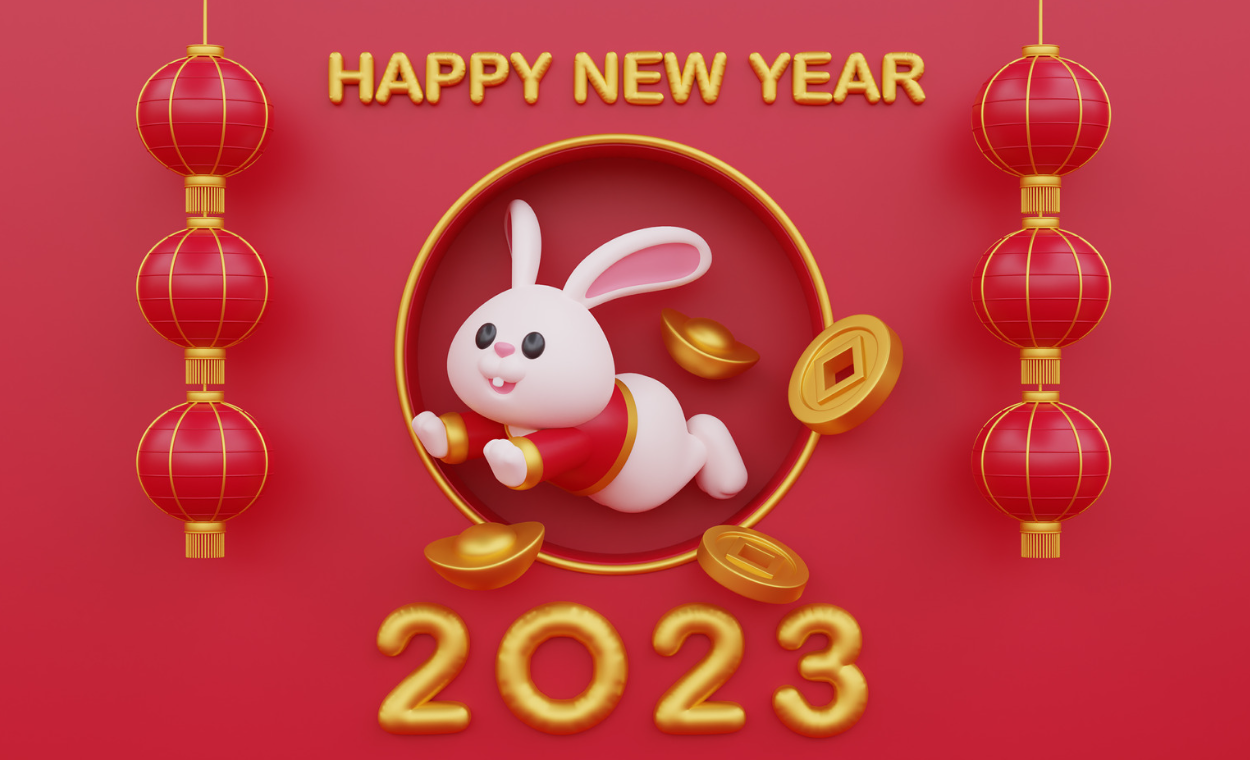Chinese New Year – which this year falls on Sunday, 22nd January – is full of fun, colour and well wishes. If you’re looking for inspiration on how to celebrate the arrival of the year of the Rabbit, you can deep-dive the detail on Wikipedia or join us for our quick but informative summary below.
The celebrations last from Chinese New Year’s Eve on Saturday, 21st January to the Lantern Festival on Sunday, 5th of February. Hands down the most important celebration of the Chinese calendar, this period symbolises the end of everything negative from the past year and the welcoming of happiness and prosperity for the year ahead. The main three events are detailed below.
- Chinese New Year’s Eve (AKA Lunar New Year’s Eve) on 21st January marks the start of the Spring Festival. Highlights include:
– an elaborate family reunion dinner that all family members are expected to attend. Typical dishes have special meanings. Dumplings represent wealth. Glutinous rice cakes suggest a higher position or higher income. Tangerines and oranges symbolise wholeness, togetherness and wealth. Longevity noodles – which are longer than normal noodles – are said to bring the eater a long life.
– the Spring Festival Gala, one of China’s most-watched shows. Featuring Chinese celebrities, dancing, singing and other entertainment, Chinese families stay up late to watch it, sending each other Happy New Year messages to come midnight.
– loud fireworks and firecrackers – the modern equivalent to how people used to burn bamboo to scare away evil spirits.
– bright red lanterns, couplets, flowers, paper cutouts, and inverted 福 (fortune) characters. These decorations adorn houses and businesses to drive away bad luck and attract good fortune, health and peace. Chinese people also clean their homes from top to bottom to sweep away any ill-fortune and make way for incoming good luck. To avoid sweeping away all the incoming good fortune, they then put away all their brooms, brushes and dusters until the end of the festivities.
- Chinese New Year’s Day on 22nd January is traditionally a day for visiting relatives (particularly the oldest and most senior family members), giving presents and visiting ancestors’ graves. Other customs and traditions include:
– the exchange of mandarin oranges, which symbolise wealth and good luck.
– the gifting of cash-stuffed red envelopes from senior family members to children and teenagers. Business managers may also give bonuses in red packets to employees to symbolise a smooth-sailing career. Amounts ending in eight are favoured as this number is associated with prosperity, while amounts ending in four are avoided as they’re thought to bring bad luck.
– colourful dragon and lion dancing. Both are an extremely important part of the celebrations. Symbolising bravery, strength and superiority, the lion is believed to drive away evil and protect people and their livestock. The dragon – symbolising wisdom, power and wealth – is also thought to bring good luck (and prosperity).
- The Lantern Festival on 5th February 2023 marks the end of the Spring Festival period and the first full moon of the new lunar year. High points include:
– red lanterns which are lit and hung, flown or carried to symbolise people letting go of the past year and welcoming the new year with all its incoming good fortune. People write riddles on notes and stick them to their lanterns, which children and adults then guess. If someone thinks they have the right answer, they pull the riddle off and check their answer with the lantern owner. If they’re right, they usually receive a small prize.
– widely regarded as the Asian version of Valentine’s Day, single women write their contact number on mandarin oranges and throw them into a body of water during the Lantern Festival. Single men collect the oranges and eat them. A sweet taste bodes well for romantic love and is likely to prompt a call but a sour taste, suggesting failed romance, is usually met with radio silence.
What a feast for all the senses! However you choose to celebrate Chinese New Year, your trusted partners at ABL Recruitment wish you a very Happy Lunar New Year of the Rabbit!










